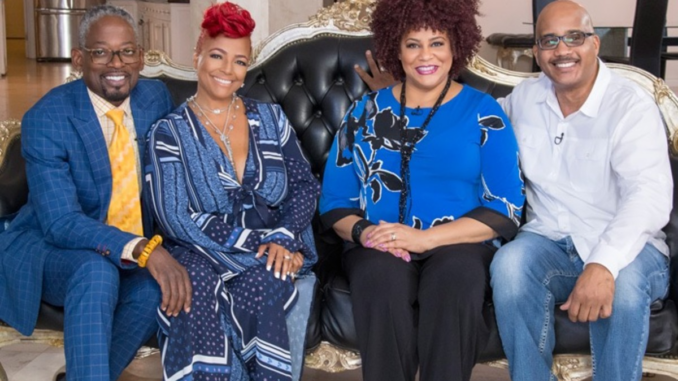
“Living Single” was one of the most iconic sitcoms of the 90s. It gave us unforgettable characters, hilarious moments, and a snapshot of life as a single person navigating the ups and downs of relationships, careers, and friendships. But then came the final season, and let’s be real: things got weird. Fans who had followed the show faithfully were left scratching their heads, wondering, what in the hell happened?
In this article, we’re going to break down what went wrong in that final season of “Living Single,” from bizarre plot twists to sudden character changes. Buckle up, because the truth behind the last season is far more complicated than you might think.
The Rise and Fall of “Living Single”
Before we dive into the chaos of the last season, let’s take a moment to appreciate why “Living Single” was such a fan favorite in the first place. The show, which aired from 1993 to 1998, was groundbreaking. It portrayed the lives of four Black women—Khadijah, Maxine, Regine, and Synclaire—and their equally lovable male friends living in Brooklyn. It was funny, fresh, and showcased relationships that many viewers could relate to.
The chemistry between the cast was undeniable, and the show was praised for its progressive and positive portrayal of Black life. So, why did the final season feel like it came out of left field?
The Ratings Plunge and Its Impact
By the time the show reached its final season, ratings had started to slip. It wasn’t just about declining viewership—there were internal issues, too. The behind-the-scenes drama, which often plagues even the most beloved shows, began to take its toll on the series.
The show’s shift from its original format became noticeable. What was once a fun, lighthearted sitcom about friendship and love slowly transformed into a patchwork of storylines that seemed forced and out of character. This drop in quality coincided with the show’s move from NBC to the struggling WB network, which left many fans feeling like the show was losing its spark.
Sudden Changes in Character Arcs
One of the most jarring aspects of the last season of “Living Single” was how the characters’ personalities seemed to shift almost overnight. Take Maxine Shaw, for example. Maxine was once the ultimate feminist lawyer, who didn’t take crap from anyone, especially men. But suddenly, in the final season, she was depicted as desperate for love, clinging to relationships that felt completely out of character.
Similarly, Regine Hunter’s evolution was a head-scratcher. Regine was known for being the glamorous, high-maintenance socialite. But by the final season, she was suddenly more down-to-earth and less obsessed with her looks. The change felt abrupt and unearned, leaving fans wondering if the writers had lost touch with who the characters were.
The Love Triangle that Made No Sense
Speaking of character changes, let’s talk about the love triangle between Khadijah, Kyle, and Overton. For four seasons, Khadijah and Kyle had a classic will-they-won’t-they dynamic. Fans were invested in their relationship, but by the final season, the love triangle with Overton was thrown in, and it didn’t make sense.
Khadijah and Overton’s sudden romantic interest felt forced and out of nowhere. Viewers were left feeling like the show was trying too hard to push a storyline that didn’t flow naturally. This forced love triangle left a sour taste in the mouths of fans who had been invested in Khadijah and Kyle’s relationship for so long.
A Misleading Finale?
The final episode of “Living Single” left fans with more questions than answers. Unlike many shows that wrap up neatly with a satisfying conclusion, the “Living Single” finale felt incomplete. The relationships were unresolved, character arcs were abandoned, and there was no clear sense of closure.
For a show that had been so expertly balanced in its earlier seasons, the finale was almost an afterthought. It seemed as though the writers were rushing to wrap things up without properly addressing the complex relationships that had been built over the years.

Was This Really the End?
The final season’s uneven storytelling wasn’t just about the characters—it also affected the show’s tone. What had once been an insightful, light-hearted exploration of single life in Brooklyn became a confusing mess of half-baked plots and forced resolutions. It didn’t feel like “Living Single” anymore.
Perhaps the biggest shocker of all was that the series ended so abruptly. It seemed like there could have been more stories to tell, and the way the show ended left many fans wishing for a proper send-off that never came.
The Network Switch and Its Role in the Decline
“Living Single” had a massive following during its first few seasons, but the show’s switch from NBC to the WB network was a huge turning point. Many believe that this change in networks had a significant impact on the show’s overall direction.
At NBC, the series had the resources and support to thrive. The network provided a larger platform for the show to flourish, and its writing team was able to maintain consistency and quality. However, once “Living Single” moved to the WB, a smaller network with fewer resources, the quality of the writing and the overall tone of the show began to suffer.
Behind the Scenes: The Real Reason for the Decline?
While the network switch and the drop in ratings likely played a part, there were other factors behind the last season’s decline. Cast departures, creative differences, and the increasing difficulty of keeping a show fresh after several seasons all contributed to the show’s eventual downfall.
It’s no secret that many of the cast members had mixed feelings about the direction the show was taking. As the series dragged on, there were reports of dissatisfaction with the writing and frustrations with the lack of a clear creative vision for the final season. These behind-the-scenes issues certainly contributed to the lackluster finale.
Could the Show Have Been Saved?
Looking back, it’s clear that “Living Single” had a lot of potential left in the tank. The series had strong characters, a dedicated fan base, and a fresh perspective on life in the big city. But what could have saved the show?
First and foremost, the writing needed a reset. The characters’ motivations needed to be clearer, and the storylines needed to return to the heart of what made the show great: friendships, love, and the challenges of single life. A better balance between character-driven stories and the overarching narrative could have salvaged the final season.
Conclusion: The Mixed Legacy of the Final Season
The last season of “Living Single” is a strange chapter in the show’s legacy. While the series itself is still beloved by fans for its groundbreaking portrayal of Black women’s lives and relationships, the final season left a bitter aftertaste. It’s a reminder that even the best shows can falter when the heart of the story is lost.
Despite the disappointing final season, “Living Single” remains an iconic show that will always have a special place in TV history. Its humor, its characters, and its cultural significance continue to resonate with audiences, proving that its legacy is much bigger than its final season.
FAQs
1. Why did “Living Single” end after season 5?
“Living Single” ended after season 5 due to a combination of declining ratings, network changes, and behind-the-scenes issues, which ultimately led to a lack of support for the series.
2. Was the last season of “Living Single” planned out in advance?
No, the last season seemed rushed, with sudden changes to character arcs and storylines that didn’t feel organic to the show’s earlier seasons.
3. What happened to Khadijah and Kyle’s relationship in the final season?
Khadijah and Kyle’s relationship became strained in the final season, and a love triangle with Overton was introduced, which confused and upset many fans.
4. Was there any closure in the final episode?
The final episode left many unresolved plotlines, offering no true closure to the characters or their relationships, which disappointed fans who were hoping for a more satisfying conclusion.
5. Could “Living Single” have been revived after the last season?
Given its cultural significance and strong fanbase, there was potential for a revival of the show. However, the lack of a proper send-off in the final season left many wondering what might have been if the series had continued in its original format.
